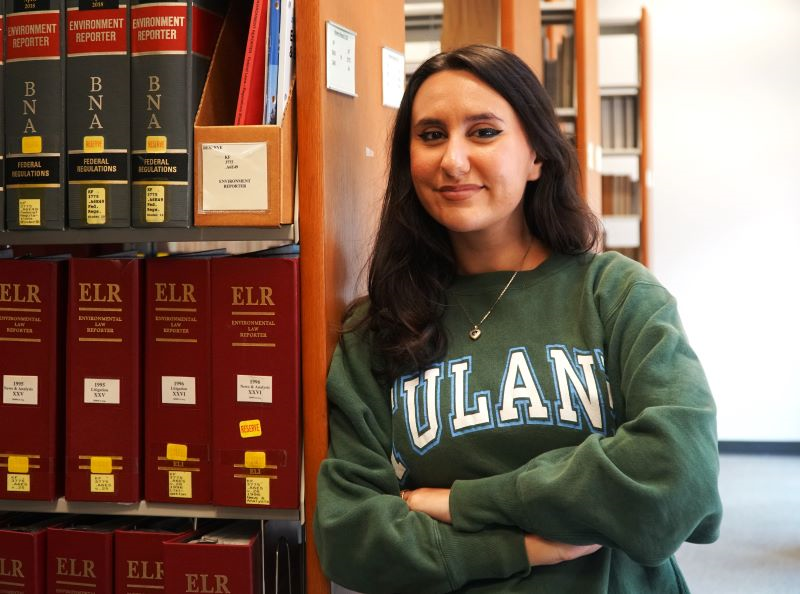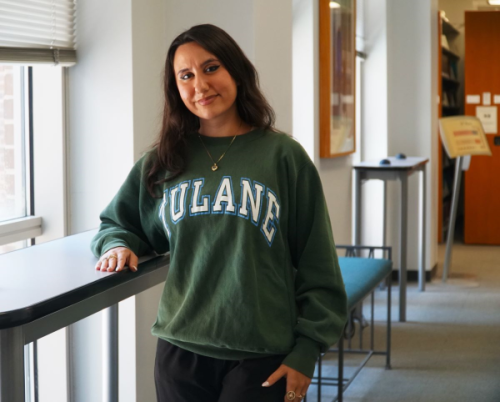First-year Tulane Law student tells her story of being ‘stateless’
Daiana Lilo is stateless, a person without citizenship in any country.
The first-year student at Tulane Law School is one of the rare cases in the U.S. of someone being without a country, meaning they don’t have an existing birth certificate or passport from anywhere.
For Lilo, 24, it was the single biggest challenge of her life, and one that has given rise to her determination and resilience to shape her future work as a lawyer.
“This is such a foreign concept in the U.S.,” she said, adding that fewer than 220,000 people in the U.S. are considered stateless. “No one knows or understands what it means to have no passport from anywhere. I have no pathway to citizenship anywhere.”
Most people are unfamiliar with the issue of statelessness because it’s a tiny fraction of immigration cases and not something that’s commonly addressed in the public conversation.
Lilo came to Tulane Law to learn how she might advocate on behalf of those who are stateless, for herself and thousands of others like her. She was born to Albanian parents in Greece, which does not have birthright citizenship. Her family, seeking a better life, traveled to the U.S. when she was just 18 months old.
As a kid, Lilo spent a lot of time dodging questions that might reveal her immigration status. Summer camps? Out of the question, since they required parents provide Social Security identification. Doctor’s appointments? Ditto because there was no health insurance. An offer to apply for a high school summer fellowship at a prestigious university? Not a chance, since identification was required.
Without Greek birthright citizenship or U.S. citizenship, Lilo is not a national of any country. She is in immigration limbo.
For all the difficulties that being stateless has brought to her life, hiding it was worse, she said.
“I was raised not to talk about it,” Lilo said. “I would tell friends that I failed my driving test because I couldn’t apply for a driver’s license. I couldn’t go to the emergency room because we had no insurance or identification. I was living a double life and had no one I could confide in to help me.”
But as she got older the ramifications made her life even harder.
“As a child I didn’t feel the repercussions that I feel now, like the inability to take out student loans, complete a FAFSA application, leave the country, and work legally without having to apply for a work permit every two years,” Lilo said.
It wasn’t until she was 16 that she applied for DACA (Deferred Action for Childhood Arrivals), an administrative permission that protects eligible immigrants who came to the U.S. as children from deportation. It gave her a work permit and a social security number for the first time in her life.
As a DACA recipient, Lilo realized she would have no assistance covering the cost of her education since undocumented people do not qualify for any financial aid. For her father, a construction worker, and her mother, who works in a diner, the cost of college was prohibitive.
“I had to get the best grades and go to an Ivy League school because otherwise, I would have no financial aid,” Lilo said.
Ivy League schools have significant private endowments that allow them to offer full-ride scholarships to high-achieving students, and so Lilo focused on getting into one.
“No matter my achievements, no matter my qualifications, it all came down to following the rules. It was dehumanizing as if I wasn’t worthy unless I could check off the boxes,” she said.
She worked hard and graduated valedictorian of her high school class, taking the opportunity to tell her story in her valedictory speech.
“I realized I couldn't leave high school and go and start a new life and not tell everybody about who I am. And it was difficult to do,” she wrote in a blog for the United Nations Refugee Agency. “I almost cried during the address; students that didn't even know me and their parents were coming up to me and saying, ‘Your story was beautiful. Thank you so much for your speech. You just put a voice into the community of being an immigrant and having success.’ ’’
She was accepted at Harvard University, where she graduated with high honors and a bachelor’s degree in political science and data science.
Along the way, she became involved with United Stateless, the only organization addressing statelessness in the U.S., through the group's legal clinic, advocacy efforts, and community-building initiatives. She was featured in a short documentary Citizens of Nowhere, which captures Lilo's journey from a Harvard student to a USL advocate and the legal changes needed to permanently address statelessness in the U.S.
"Daiana has been a dedicated leader and she’s played an inspiring role in amplifying our mission," said Karina Ambartsoumian-Clough, Executive Director of United Stateless.
Since telling her story of statelessness, Lilo has found her voice.
“When I finally broke the ice in high school, it became something I wanted to talk about more often,” she said. “Statelessness has gone on in the quiet for too long, and its stigma has led to the exploitation of countless stateless people. But when I tell my story, people in similar circumstances often approach me and tell me how encouraged they were by hearing it. The more we connect, the more we realize there is power in talking.”
Lilo worked in a New York law firm after graduating from Harvard, and that fueled even more interest in becoming a lawyer.
“As a future lawyer there is power in first-hand understanding,” Lilo said. “I will directly represent stateless individuals, facing their challenges head on. Who better to represent an undocumented client than an undocumented lawyer herself?”


